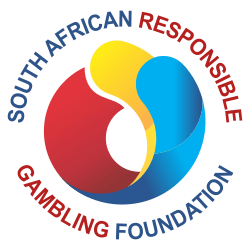South African Responsible Gambling Foundation
The South African Responsible Gambling Foundation (SARGF) was founded in June 2000 and incorporated in 2004 to combat problem gambling in South Africa ever since the gambling industry was legalised in mid-1996. The organisation also provides free support and confidential treatment to people suffering from gambling addiction, educate South Africans on the dangers of gambling addiction through its responsible gambling summit, and creates guidelines for gambling operators to follow.
The foundation is mostly known for its National Responsible Gambling Programme (NRGP), which is a public-private initiative between government gambling regulators and gambling industry operators within the South African gambling industry. Operators within the South African gambling industry include both online and land-based casinos, bookmakers, bingo halls, and poker rooms.
These gambling establishments donate a voluntary contribution of 0.1% of their Gross Gambling Revenue, which is money staked minus the amount paid out in winnings, to the SARGF. Apart from these donations, the SARGF receives public grants to provide free support, host special projects, family therapy, and provincial responsible gambling interventions and programs.
The NRGP has a mentorship service program headed by an executive director. The mentorship service includes support from NRGP's mentorship programme manager and other services which help players who have fallen into gambling addiction.
As an independent regulatory body, the SARGF reports everything related to gambling in South Africa to the national authorities. The key focus of the foundation is to prevent and treat compulsive and problem gambling in South Africa.
If you think you are suffering from excessive gambling or think someone you know is suffering from a gambling addiction, you can call the toll-free counselling line at 0800 006 008 or SMS HELP to 076 675 0710. Alternatively, you can send an email to helpline@responsiblegambling.org.za.
By Adiela de Bruyn - Last modified 2024/02/08 - Estimated reading time: 8 minutes.
Table of contents

Self-Exclusion and Intervention
The SARGF provides counselling and support for excluded individuals and immediate family members through its National Responsible Gambling Programme (NRGP). Via this program, individuals can exclude themselves from gambling activities, both online and offline. Self-exclusion sessions always come with a 6-month cooling-off period and within this period of exclusion, the excluded individual is provided with free counselling.
You can request self-exclusion at provincial gambling boards or through the online casino or bookmaker you're playing at. Note that it is the responsibility of the player who requested self-exclusion to ensure he or she complies with the terms of the self-exclusion. The self-exclusion period is usually between 6 months to 5 years depending on the severity of the gambling problem.
In the case that a player is denied access to a gambling venue because of being self-excluded and the player objects, the venue can deny the player future access and additionally charge the player for trespassing.
A self-excluded player can send a request for the upliftment of the self-exclusion order at any given time. However, the self-exclusion will only be uplifted if the player has been self-excluded for at least six months and has had at least one session with a SARG treatment and mental health professional.
What Other Measures Can I Take While Gambling Online?
Gambling is an entertaining and pleasurable activity but constant gambling can develop into a gambling problem. Many players wonder about the steps they can take to protect themselves from compulsive gambling and its negative consequences. Here are some of the steps you can take to promote responsible gambling habits during physical and online gambling sessions:
- Use Available Tools: If you enjoy playing at online casinos but don't want to become addicted to gambling, wager more money than you should, or play for longer than originally intended use the available responsible gambling tools.
- Set Limits and Self-Exclusion Breaks: Although the exact procedures differ from casino to casino, all of our top-rated South African casinos allow players to set limits for themselves. These include deposit, loss, and play time limits within your online casino account settings.
- Seek Help: Apart from setting limits, players are encouraged to call the available counselling line or contact organisations that provide free support if necessary. For example, you could speak to NRGP's mentorship programme manager. The mentorship service includes hands-on help for players with gambling problems.
When Are You Considered a Problem Gambler?
It often happens that those around you already suspect that you have a gambling problem, while you don't yet see or don't want to see it. Denying being a problem gambler is part of being addicted to gambling.
Are you wondering whether you might have a gambling problem, are you concerned about your gambling behaviour, or do you have gambling debts?
Then take note of the following: a gambling addict slowly but surely ends up in a vicious circle. At first, you play to win; if you lose, you play to win back your lost money (called chasing losses). This can go on for a long time, resulting in gambling debts.
Problem gamblers exhibit various warning signs that you can use to measure yourself and determine if you are addicted to gambling or not. You can also take the self-check quiz to determine if you display any of the symptoms. The most important characteristics of gambling addiction at a glance are:
- Constantly thinking about gambling: One symptom of problem gambling is always thinking about gambling. This has various negative effects on an individual's work and personal life.
- Lying about gambling: People suffering from gambling addiction usually lie to friends and family members about their gambling.
- No control over gambling: Problem gambling makes it hard for players to control the time spent during gambling sessions. Individuals suffering from problem gambling find it hard to stop gambling and it affects the person's life in various ways.
- Failed attempts to stop gambling: Problem gamblers may have tried to stop gambling but are unable to do so without external help.
- Neglecting social contacts: People gambling compulsively cannot create time for their friends and social obligations. These include not going to work, school, and religious obligations.
Causes of Gambling Addiction
There are several reasons why people who gamble become addicts or develop bad gambling habits. Sometimes, gambling addiction is the main problem, while it may be the symptom of an underlying problem.
Here are some of the causes of gambling addiction:
- Bipolar disorder and other personality disorders: make it easy for individuals to have addictive tendencies.
- Traumatic events: may make individuals seek comfort in gambling or other activities to drown out emotions. Traumatic events also make individuals dependent on external sources of support.
- Substance use and drug abuse: create conditions that facilitate gambling addictions.
- Personal characteristics: such as sensation-seeking or a negative self-image.
- Environmental factors: including friends, family, and acquaintances, the type of game you play, and other social factors.
- Some medications: can cause addiction as a side effect.
Consequences of Gambling Addiction
Gambling problems have numerous consequences on a person's life. Pathological gambling can affect your financial well-being, relationships with family members, and other interpersonal relationships. Here are some of the problems gambling addiction can cause:
- Rising debts: occur because they borrow more and more money, which impacts their financial well-being.
- Commit fraud or steal: to get money.
- Debts pile up: as the odds are not in your favour, so gambling costs money.
- Arguing by lying and downplaying problems.
- Fatigue: is another potential harmful effect that is accompanied by exhaustion or being restless.
- Job loss and fractured relationships: with immediate family members is another potential harmful effect of gambling addiction.
- Loneliness: due to neglecting social contacts and even suicide.
Frequently Asked Questions About SARGF
What does the South African Responsible Gambling Foundation do?
The South African Responsible Gambling Foundation (SARGF) prevents and treats problem gambling among South African residents. It also reports on gambling activities in South Africa and promotes responsible gambling initiatives to help those suffering from problem gambling.
What is the SARGF treatment programme?
The SARGF (South African Responsible Gambling Foundation) treatment program is a free-of-charge 24/7 service that includes free counselling by trained and qualified treatment professionals. This program caters to both outpatient and inpatient South Africans. The outpatient program consists of face-to-face counselling with free and confidential treatment, while the inpatient program is done through direct telephone support counselling. Call the toll-free counselling line with your local or international number for more details.
How do casinos support awareness around responsible gambling?
They fund the National Responsible Gambling Programme (NRGP) and include a responsible gambling slogan or tagline "Winners know when to stop" in their commercials. Gambling companies also provide access to responsible gambling programmes, treatment options, and responsible gambling organisations through their websites. In addition, gamblers have access to tools like self-exclusion, direct telephone support, and counselling services.
What does the South African Responsible Gambling Foundation logo mean or symbolise?
The SARGF (South African Responsible Gambling Foundation) circle-shaped logo refers to a holistic approach to treatment and confidentiality, while the bright colours refer to optimism, positivity, and strength.
How are gamblers categorised?
The South African Responsible Gambling Foundation categorises gamblers into four categories: non-gamblers, recreational gamblers, problem gamblers, and compulsive gamblers. Recreational players participate in gambling activities strictly as an entertaining and pleasurable activity, while problem and compulsive gamblers participate in extreme levels of gambling. About 1.5% of the entire SA population consists of compulsive gamblers. Players can use a self-check quiz to determine which category they fall under. Players who discover they have a problem after the self-check quiz are advised to use the free support provided by the SARGF.







